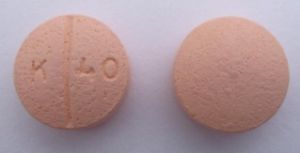Benzphetamine Dosage
Medically reviewed by Drugs.com. Last updated on Jul 24, 2025.
Applies to the following strengths: 50 mg; 25 mg
Usual Adult Dose for:
Usual Pediatric Dose for:
Additional dosage information:
Usual Adult Dose for Obesity
Initial dose: 25 to 50 mg orally once a day in the mid-morning or mid-afternoon, according to the patient's eating habits.
Maintenance dose: 25 to 50 mg orally one to three times a day; dose or frequency should be individualized based on the patient's needs and response.
Comments:
- It may be desirable to avoid late afternoon administration in some patients.
- Continue treatment only if the patient has satisfactory weight loss within the first 4 weeks of treatment (i.e., weight loss of at least 4 pounds, or as determined by the physician) to limit unwarranted exposure and risks.
- This drug is indicated for use as monotherapy only.
Use: Management of exogenous obesity as a short term (a few weeks) adjunct in a regimen of weight reduction based on caloric restriction in patients with an initial BMI of 30 kg/m2 or higher who have not responded to appropriate weight reducing regimen (diet and/or exercise) alone.
Usual Pediatric Dose for Obesity
Initial dose (Age 12 to 17 years): 25 to 50 mg orally once a day in the mid-morning or mid-afternoon, according to the patient's eating habits.
Maintenance dose (Age 12 to 17 years): 25 to 50 mg orally one to three times a day; dose or frequency should be individualized based on the patient's needs and response.
Comments:
- Use of this drug is not recommended in children under 12 years.
- It may be desirable to avoid late afternoon administration in some patients.
- Continue treatment only if the patient has satisfactory weight loss within the first 4 weeks of treatment (i.e., weight loss of at least 4 pounds, or as determined by the physician) to limit unwarranted exposure and risks.
- This drug is indicated for use as monotherapy only.
Use: Management of exogenous obesity as a short term (a few weeks) adjunct in a regimen of weight reduction based on caloric restriction in patients with an initial BMI of 30 kg/m2 or higher who have not responded to appropriate weight reducing regimen (diet and/or exercise) alone.
Renal Dose Adjustments
Data not available
Liver Dose Adjustments
Data not available
Dose Adjustments
When tolerance to the anorectic effect develops:
- Do not exceed the recommended dose to increase the effect; Discontinue treatment.
Precautions
Safety and efficacy have not been established in pediatric patients. Use of this drug in children under 12 years is not recommended.
Consult WARNINGS section for additional precautions.
US Controlled Substance: Schedule III
Dialysis
Data not available
Other Comments
General:
Drug Abuse and Dependence:
- This drug is related chemically and pharmacologically to amphetamines, which have been extensively abused.
- Abuse of amphetamines and related drugs may be associated with intense psychological dependence and severe social dysfunction.
- Abrupt cessation following prolonged high dosage results in extreme fatigue, mental depression, and sleep EEG changes.
- The possibility of abuse with this drug should be kept in mind when evaluating whether to use this drug as part of a weight reduction program.
Overdosage:
- Management of acute amphetamine intoxication is largely symptomatic and includes sedation with a barbiturate.
- Consider use of a nitrite or rapidly acting alpha receptor blocking agent if hypertension is marked.
- Urine acidification increases amphetamine excretion.
- Oral LD50 in rats is 104 mg/kg and 174 mg/kg in mice. The intraperitoneal LD50 is 153 mg/kg in mice.
Monitoring:
Cardiovascular: Cardiac evaluation (baseline), echocardiogram (during and after treatment), blood pressure
Metabolic: Weight
Other: Waist circumference
Patient advice:
- Avoid driving and other activities that require alertness (such as operating machinery) until you know how this drug affects you.
More about benzphetamine
- Check interactions
- Compare alternatives
- Pricing & coupons
- Reviews (20)
- Drug images
- Side effects
- During pregnancy
- Drug class: anorexiants
- En español
Patient resources
Other brands
Professional resources
Other brands
Related treatment guides
See also:
Further information
Always consult your healthcare provider to ensure the information displayed on this page applies to your personal circumstances.


